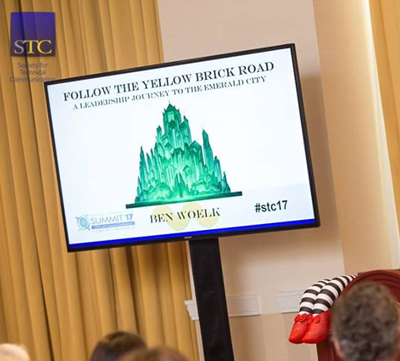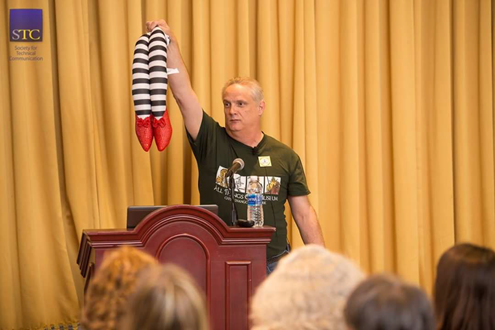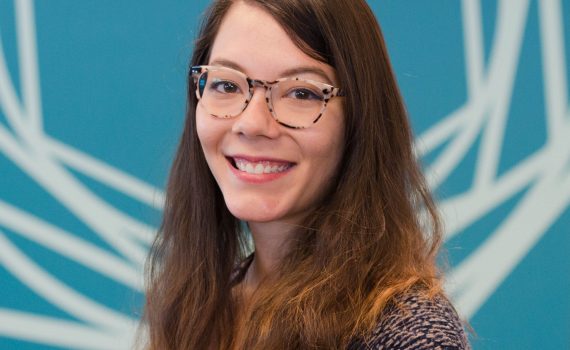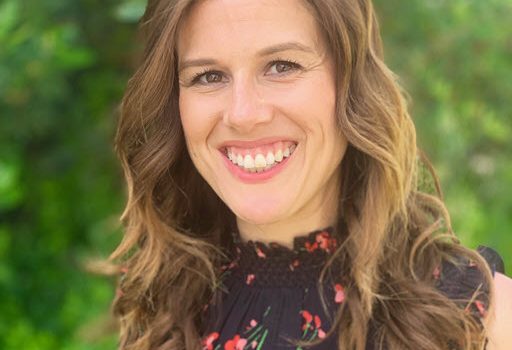
Episode 026: Ben Woelk–Follow the Yellow Brick Road
Category:Introverted Leadership,Leadership,PodcastPodcast: Play in new window | Download
Subscribe: Spotify | Amazon Music | iHeartRadio | Podchaser | TuneIn | Deezer | RSS
Episode 026 Show Notes: Ben Woelk
Introduction
Ben Woelk shares his article, “Follow the Yellow Brick Road: A Leadership Journey to the Emerald City.” Ben discusses the leadership lessons from the journey for the Scarecrow, a Rational leader, the Tin Woodman, an Idealist leader, and the Lion, an Artisan leader.

Key concepts
- The Wizard of Oz provides leadership lessons.
- Rational leaders are innovative, typically highly intelligent, and problem solvers.
- Idealist leaders are catalysts.
- Artisan leaders as practical, with an eye to the realities around them.
- The physical tokens helped the protagnoists understand their internal strengths and make it outwardly obvious what these character strengths were for each of them. Although we may not have physical tokens that help to remind us and others of our inner strengths, we are much more attuned to the role of these strengths in our workplaces.
- An understanding of temperament types can help us work with managers and employees of other temperaments.
Quotable
Understanding our temperament type helps us perform more effectively, both as individuals and as a team.
An Idealist team leader who wants to talk about the contributions of the individual members of the team may find the conversation with an Artisan manager frustrating.
Each of the travelers in the Wizard of Oz follows the Yellow Brick Road to self-discovery, finding that they possess the strengths they believe they lack
Resources or Products Mentioned in this Episode
- Baum, L. Frank. The Wonderful Wizard of Oz
- Fleming, Victor, Director. The Wizard of Oz.
- Society for Technical Communication
- Keirsey, David. Please Understand Me II
- Keirsey.com
- Daniel Goldman, Emotional Intelligence
- Ben Woelk Presentations Page
Links
- Follow Hope for the Introvert on Twitter
- Like my page on Facebook
- Support me on Patreon
- Get swag for Hope for the Introvert and Introverted Leadership at Zazzle
The article first appeared in the Summer 2018 Journal of the American Medical Writer’s Association and is reprinted here with their permission. The article grew out of a presentation of the same name that I did at the Society for Technical Communication 2017 Summit conference in Washington, DC. I’ve provided pictures from the presentation, the slides, and a copy of the sketch notes by Elizabeth Alley after the post.
Follow the Yellow Brick Road: A Leadership Journey to the Emerald City
Have you ever felt as if your professional journey has a surprise around every bend? Much like Dorothy in the Wizard of Oz, have you found unexpected challenges along your career path? Are there lessons that can be applied from these challenges? Follow the Yellow Brick Road and discover lessons about leadership from the Wizard of Oz characters we’ve grown to love.
Introduction
I’ve had a lifelong fascination with MGM’s The Wizard of Oz2, both afraid of and intrigued by the flying monkeys and amused by Scarecrow, Tin Woodman, and Lion, but mostly engaged by a storyline that drew me along on their journey. For the last several years, I have studied leadership development, participated in leadership podcasts and webcasts, delivered presentations and workshops on leadership development, mentored emerging leaders, and championed the leadership abilities of introverts.
I thought it would be interesting to see what lessons we might draw for leadership by applying Keirsey Temperament Theory to the four protagonists of The Wizard of Oz: Dorothy, Scarecrow, Tin Woodman, and Lion. Even a cursory look at how they handled obstacles and interacted with each other provides valuable lessons for the workplace and personal life.
Keirsey Temperament Theory and the Wizard of Oz
In Please Understand Me II3, David Keirsey discusses how four main temperament types—Guardian, Rational, Idealist, and Artisan—may apply to these characters from The Wizard of Oz, as well as to our own leadership styles.
Dorothy, the Guardian Leader
Keirsey describes Guardians as the “glue” that holds society together. Guardians are concerned with order, with right actions, and with providing a secure environment for those under their charge. They are also helpful and concerned with the welfare of others. Guardians are stabilizing leaders. In both the book The Wonderful Wizard of Oz1 and the movie, Dorothy is the glue that holds the travelers together. Although she provides both stability and security to the party, Dorothy seeks a way to return to a safe environment: her home in Kansas with Auntie Em and Uncle Henry. Throughout their journey, Dorothy leads the party to The Wizard, convinced that he will help her to find her way home.
Scarecrow, the Rational Leader
Rational leaders are innovative, typically highly intelligent, and problem solvers. The Scarecrow believed that he had no brain. To the contrary, the Scarecrow was clearly the most creative in being able to analyze a situation and pose innovative solutions. For example, he devised the plan to get apples from a hostile apple tree by tricking the tree into throwing apples at the traveling party and coordinated the plan to rescue Dorothy by stealing and wearing the Winkies guards’ uniforms after Dorothy’s capture by the Wicked Witch.
Tin Woodman, the Idealist Leader
According to Keirsey, idealist leaders are catalysts because they energize productive human relations. Idealist leaders are enthusiastic, strive for harmony and care deeply for those in their charge. They are people-centered, intuitive, and patient, often putting the needs of individuals above the needs of the business or task at hand. The Tin Woodman believes that he has no heart or feelings and is unable to express love. Despite this, as an Idealist, he cares deeply for the well-being of the party. He races into action when the travelers face the Kalidahs (i.e., beasts with bodies like bears and heads like tigers), the most feared predators in the Land of Oz.
Lion, the Artisan Leader
Keirsey describes Artisan leaders as practical, with an eye to the realities around them. Artisan leaders deal with concrete problems (clear and obvious problems), not abstractions about what might occur. Artisans will do whatever it takes to solve a problem, are expeditious, and move rapidly to arrive at a solution. They excel at on-the-spot decision making but are impulsive and prefer to “fly by the seat of their pants.” Most of all, they are risk takers. Although lions are commonly considered to be the King of the Beasts, Lion believes that he lacks courage. However, Lion displayed bravery by protecting the team along the way to see the Wizard. For an artisan leader, courage means doing what needs to be done against all odds, even in the face of fear.
Applying the Lessons of Oz in the Real World
In Oz, three of our protagonists gain physical tokens from the Wizard that are related to their temperament types. Scarecrow (the Rational) receives a diploma (testimonials). Lion (the Artisan) receives a medal of courage. Tin Woodman (Idealist) receives a heart. The physical tokens helped these three understand their internal strengths and make it outwardly obvious what these character strengths are for each of them. Although we may not have physical tokens that help to remind us and others of our inner strengths, we are much more attuned to the role of these strengths in our workplaces. The Wizard tell Dorothy that ever since she came to Oz that she’s always had what she needs to return home, the slippers.
Since the 1995 publication of Daniel Goldman, Emotional Intelligence, there has been increasing recognition of the role of social and emotional intelligence in building productive workplace environments.10 The development of our emotional intelligence grows from understanding what drives us and how we interact with others. That’s where temperament theory comes in. Understanding our temperament type helps us perform more effectively, both as individuals and as a team. Learning about our strengths (and weaknesses) can help us become better leaders and relate better to our colleagues in the workplace. Keirsey’s temperament types provide additional insights.
[bctt tweet=”Understanding our temperament type helps us perform more effectively, both as individuals and as a team.” username=”hopeintrovert”]
My Leadership Journey
In my own leadership journey, I’ve found that learning more about temperament types through inventories available online (humanmetrics.com, 16personalities.com, keirsey.com) , discussions with trained MBTI practitioners has helped me identify what drives me. Understanding the strengths and weaknesses of my Rational temperament type (INTJ), helps me understand how I can best lead, playing to my strengths and compensating for my weaknesses.
That understanding has also helped me understand how to best work with a manager who’s not the same temperament that I am. For example, an Artisan manager will be concerned with results. The Artisan manager may not care about the details of the journey to achieve those results. An Idealist team leader who wants to talk about the contributions of the individual members of the team may find the conversation with an Artisan manager frustrating, because what’s important to the team leader (the people) may not matter to the Artisan manager. The Artisan manager cares about the results. Different temperament types have different expectations and priorities. I have a good friend who’s an Idealist leader. She’s very conscious of the potential impacts of a decision on team members. As a Rational, in my pragmatic approach to problem solving, the impact of a decision on individuals may not even occur to me.
[bctt tweet=”An Idealist team leader who wants to talk about the contributions of the individual members of the team may find the conversation with an Artisan manager frustrating” username=”hopeintrovert”]
[bctt tweet=”As a Rational, in my pragmatic approach to problem solving, the impact of a decision on individuals may not even occur to me.” username=”hopeintrovert”]
In Closing
The Wizard of Oz is as much about the travelers discovering their hidden strengths as it is an exciting story for children and for adults. Each of the travelers follows the Yellow Brick Road to self-discovery, finding that they possess the strengths they believe they lack. Much like Scarecrow, I’ve discovered that I already possess many of the strengths I thought I lacked. I encourage you to follow your own Yellow Brick Road to identify and harness your strengths.
[bctt tweet=”Each of the travelers in the Wizard of Oz follows the Yellow Brick Road to self-discovery, finding that they possess the strengths they believe they lack.” username=”hopeintrovert”]
References
- Baum, L. Frank. The Wonderful Wizard of Oz (Chicago, IL: George M. Hill Company), 1900.
- Fleming, Victor, Director. The Wizard of Oz. (Loew’s Inc. Hollywood, CA), 1939.
- Keirsey, David. Please Understand Me II. Delmar, CA: Prometheus Nemesis Book Company), 1998.
- Myers, Isabel Briggs. Gifts Differing. Palo Alto, CA: Consulting Psychologists Press, 1980.
- Stutz, Jonathan. The Scarecrow’s Brains: Leadership Lessons from the Wizard of Oz, in CEO World, Rankings and Research Magazine, June 15, 2014
- Woelk, Ben. An Introvert’s Journey to Leadership (Proceedings, STC Summit Conference, 2016).
- Woelk, Ben. Guest Editor. Intercom: Personality, Temperament, and Technical Communication, Vol. 64, #2 February 2017
- Woelk, Ben. Lessons Learned on an Introvert’s Journey to Leadership, EDUCAUSE Review, October 17, 2016
- Leadership Lessons from the Wizard of Oz. https://spectrain.wordpress.com/2010/04/08/leadership-lessons-from-the-wizard-of-oz/ Accessed April 17, 2017.
- http://www.danielgoleman.info/topics/emotional-intelligence/. Accessed 4/22/18.
Author disclosure: This article is based in part on my presentation at the Society for Technical Communication International Summit Conference in 2017
Author contact: ben@benwoelk.com
Extras
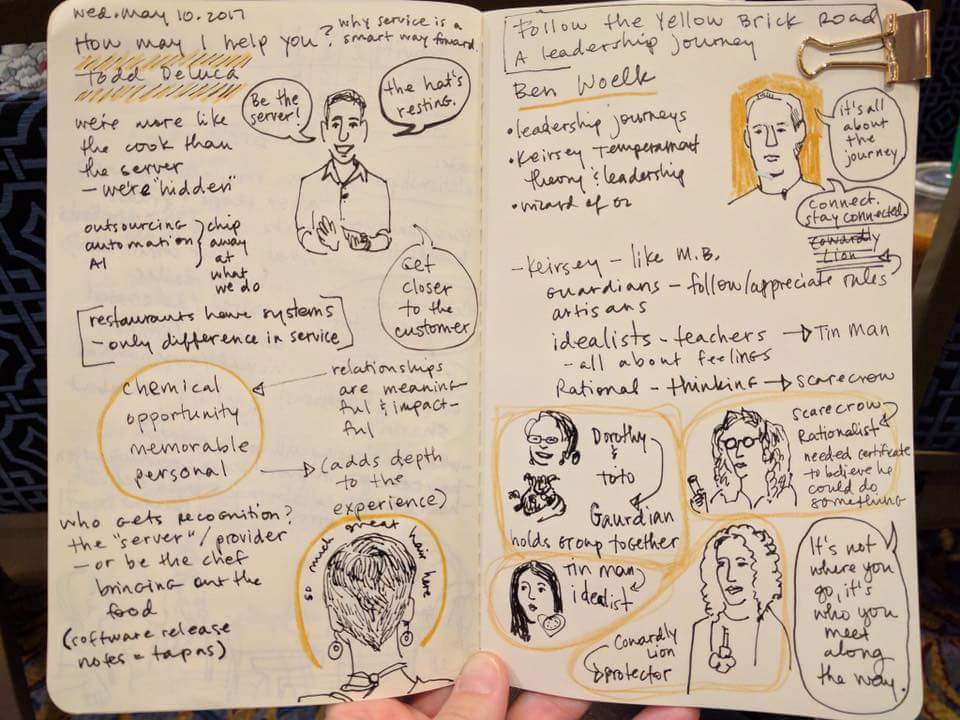
Elizabeth Alley Sketch Notes from STC Summit 2017
